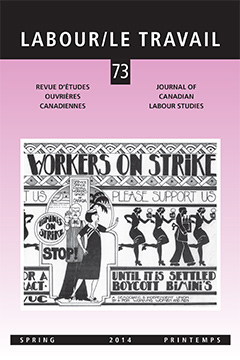The Labours of Leisure: Work and Workers at the Annual Encampments of the American Canoe Association, 1880–1910
Published 2015-05-19
How to Cite
Abstract
The late 19th century witnessed an explosion of interest in canoeing as sport, recreation, and leisure in Canada, the United States, and Britain. One of the enduring legacies of the “canoe boom” was the American Canoe Association (ACA), a transnational organization established in 1880 to “unite all amateur canoeists for the purpose of pleasure, health, or exploration.” Annual meetings were central to realizing this mission. For two weeks in August, hundreds of enthusiasts from Canada and the United States came together to camp out, socialize, and race canoes. The encampments would not have occurred – or at the very least they would have looked drastically different – without the carpenters, cooks, servers, performers, and general labourers the organization hired to do the heavy work of construction, maintenance, and service. In spite of their importance, these workers exist, at best, on the margins of the official accounts of the meets; in most cases, they are altogether ignored. Recovery of this labouring past is difficult, and admittedly fragmentary. However, it is critical to the history of labour and of sport.
La fin du 19ème siècle a vu une explosion d’intérêt dans le canoë comme un sport, une récréation et des loisirs au Canada, aux États-Unis et en Grande-Bretagne. L’un des héritages durables du « boom canoë » a été l’American Canoe Association (aca), une organisation transnationale fondée en 1880 à « unir tous les canoéistes amateurs pour le plaisir, la santé ou l’exploration. » Les réunions annuelles étaient au centre de la réalisation cette mission. Pendant deux semaines en août, des centaines de passionnés du Canada et des États-Unis se sont réunis pour camper, socialiser, et faire des canots de course. Les campements n’auraient pas eu lieu – ou tout au moins, ils auraient pu être radicalement différents – sans les charpentiers, les cuisiniers, les serveurs, les interprètes et les travailleurs que l’organisation a embauchés pour faire de gros travaux de construction, d’entretien et de service. En dépit de leur importance, ces travailleurs existent, au mieux, sur les marges des comptes officiels de la rencontre, dans la plupart des cas, ils sont tout à fait ignorés. La récupération de ce passé du monde du travail est difficile, et certes fragmentaire. Cependant, il est essentiel à l’histoire du travail et du sport.
